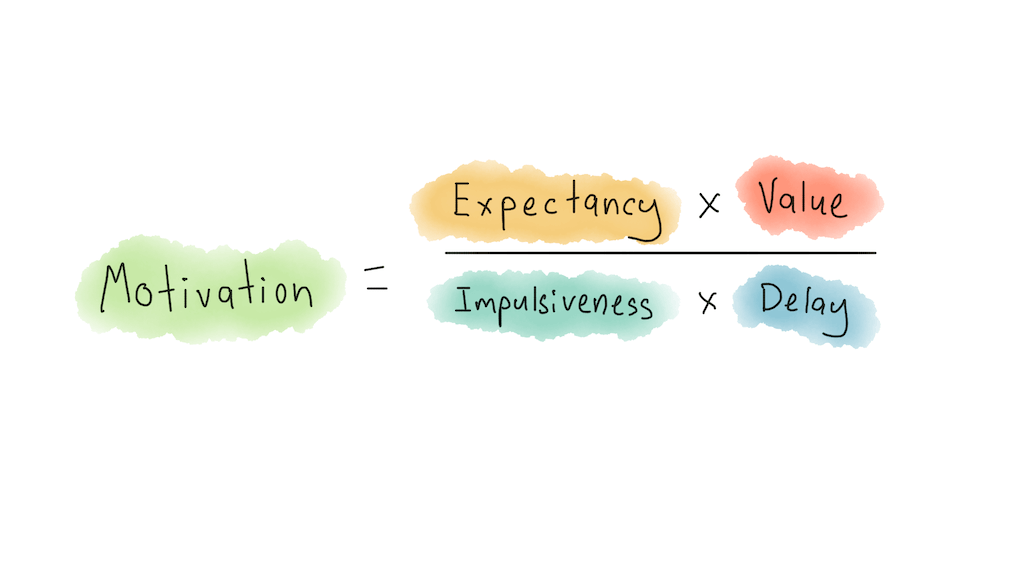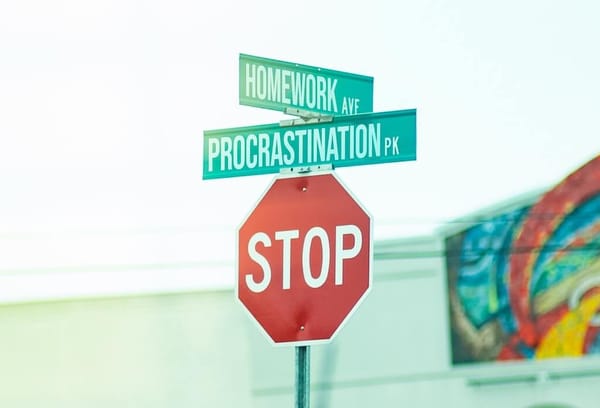I’ve delayed (with no pun intended) writing a post about procrastination, partly because I continue to struggle with it, and also because I feel like I have nothing new to contribute to the literature around beating it.
Until today.
I’ve had some success over the past seven months with the procrastination equation — procrastination being something that I have grappled with since, well, forever. I thought it would be useful to write up some notes from those months of struggle.
In the past, I’ve linked to two great blog posts on using the equation to beat procrastination: Alex Vemeer’s epic piece, as well as Luke Muehlhauser’s How to Beat Procrastination. This post isn’t meant to replace the two; instead, it’s meant to be a user’s review of the equation. In other words, my goal is to supplement existing how-to posts with notes on putting the equation to practice. My usual caveats about treating self-help as you would martial arts, and judging advice according to the hierarchy of practical evidence apply.
Context
First, some context. I currently work as an indie-entrepreneur. Because my time is my own, procrastination is one of my worst enemies.
My previous job was country manager in Vietnam for a Singaporean company; this meant that I was responsible for the collective output of the software engineering team in a small but growing org of 30. It also meant natural barriers for my tendency to procrastinate: I’ve found that it is difficult for me to put things off when other people depend on me. Call it a personality quirk, or a managerial advantage, if you will.
When I left this company to start off on my own, I discovered that procrastination was a huge problem. I haven’t fought with procrastination this much since I was a student. I suppose this post should serve as a warning to those of you who seek the indie path: being able to regulate your emotions in the pursuit of productivity (and in the absence of deadlines!) is one of the most important, under-discussed skills of indie life.
The Procrastination Equation Summarised
I’ll let Vemeer and Muehlhauser’s respective articles do the heavy lifting here. To summarise quickly, the procrastination equation was proposed by academic Piers Steel, and it says that motivation is regulated by the following four factors:

- Motivation — the opposite of procrastination
- Value — how much you enjoy doing the task, and how much you’ll enjoy the reward from completing the task.
- Expectancy — how much you expect to succeed at doing the task, and how much you expect to acquire the reward.
- Impulsiveness — how likely you are to be distracted given your environment or your history (personality, energy levels, genetics, whatever), and how good you are at staying focused.
- Delay — the further away the tasks’ reward or completion, the lower the motivation.
In essence, the equation says that higher value and higher expectancy increases your motivation; higher impulsiveness or more delay lowers it.
Assuming that you cannot change the delay associated with your tasks, this equation then implies three ways of fighting procrastination:
- Increase the expectancy of success.
- Increase the task’s value.
- Decrease your impulsiveness.
Both Vemeer and Muehlhauser provide a long list of techniques for each of these three approaches.
Remember What Procrastination Feels Like
I can vouch for the efficacy of Vemeer and Muehlhauser’s proposed techniques. In nearly all the cases of procrastination I’ve encountered over the past seven months, I've found that some combination of the above three approaches have worked.
With three important caveats.
The first caveat is that you need to recognise that you are procrastinating in order to analyse your procrastination. This is a lot harder than it sounds. In some cases, procrastination is easy to spot: when you’re watching an endless stream of Youtube videos, for instance, or when you find yourself playing Civilisation for the past three hours, it is easy for you to know that something is wrong.
It’s more difficult to detect that you are procrastinating when you are engaged in activities that feel like work, however. This includes ‘doing research’, running errands, completing chores, or finishing books. When I'm procrastinating badly, I’ve often found myself polishing off other things on my todo list, with the justification that ‘I have to do it anyway!’ (This tendency is dangerous, but also the foundation of a hilarious productivity strategy.)
If you cannot detect procrastination based on the activities that you are performing, then what can you use? It took me a few months to realise the answer: mental pressure. I have found that whenever I procrastinate, a certain part of me knows that I am avoiding the task at hand. This knowledge presents itself as an itch at the back of my mind. It makes me irritable at the end of the day, even on the days where I’ve successfully cleared all the things on my todo list.
The key to recognising that I am procrastinating, I realise, is being able to detect this mental pressure whenever it presents itself at the back of my head. It’s taken me months to do so reliably. A huge part of this challenge lies in the fact that my subconscious often takes over when I procrastinate: I find myself doing the dishes and vacuuming the house and mopping the floor before some part of me goes “wait a minute … am I procrastinating?”
Thanks to the equation, I've found it easier to fix my procrastination after I was able to ask that question. But asking that question in the first place is key! Analysis is only possible when you are cognisant of the problem.
The actionable recommendation here is: learn what procrastination feels like … to you. This might take you a couple of months, as observing internal state is more difficult than observing external behaviour. The goal is to remember this internal feeling, and then use that memory to build the trigger for analysis.
Be Kind To Yourself
I know, I know. I’ve written about the problems with self-forgiveness research. But according to my proposed hierarchy of practical evidence, the ultimate test for efficacy is … well, actual practice. And as it turns out, I have tested this technique … and I've found it to work.
Perhaps ‘self-forgiveness’ is the wrong word to use in this situation. I used to berate myself whenever I found myself procrastinating. I’ve managed to temper this tendency in recent months. The real problem with such self-flagellation is that my anger and disappointment prevented me from acting effectively to fix my procrastination problem. This sounds trite and easy now that I’ve written it out like this, but it really wasn’t. (I’ve written about this episode elsewhere).
When I say that ‘self-forgiveness’ might be the wrong word to use, I mean that I am still strict with myself, though kinder. We all know people who are too lenient on themselves, and who never change their approaches when encountering the same problem over and over. I face the opposite challenge, but leniency is one failure mode I am particularly keen to avoid.
The technique that I’ve settled on for now is to simulate my old Judo coach. Sensei Thev remains the best coach I’ve trained under, and he knew just the right amount of stern correction and gentle encouragement to get us going. You do not want to be too lenient, and you do not want to be too harsh. The goal is perfect calibration.
This is very difficult, and I am still working on it.
A Useful Measure of Progress
It helps to have a useful measure of progress when you’re trying to improve yourself. The measure I eventually settled on was ‘the number of days I procrastinate on a task’. Each episode of procrastination would thus produce a single number; my goal was to reduce that number.
At the beginning of my indie journey, I used to spend whole weeks procrastinating. I’m happy to report that I’ve gotten it down to two days on average. Some days, I can even catch my procrastination by around 3pm. This trigger would then cause me to meditate for five minutes, analyse according to the procrastination equation, and pick a relevant intervention. Such interventions work around 70% of the time.
I’ll admit that such one-day events are still rare, though. But I am so pleased with my progress that I’ve made it my current goal.
As a final note, I think this metric is remarkably pragmatic, and I’m writing about it in the hopes that some of you might find it useful. I don’t believe we can avoid procrastination 100% of the time. The usage of the procrastination equation relies on identifying procrastination through an internal, mental evaluation. This in turn means that my ability to stop procrastinating is limited by my ability to recognise my mental state.
Sensitivity to mental state is something I’m trying to improve anyway, independently of this procrastination project. It’s something that I think is a worthwhile goal, for any person, at any rate.
Originally published , last updated .





